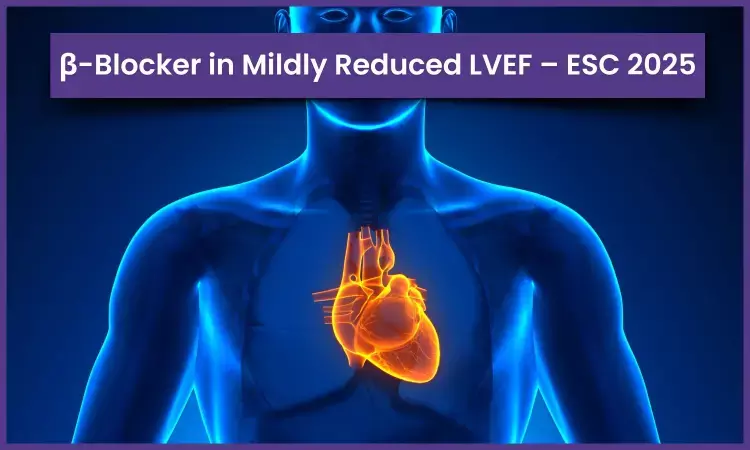- Home
- Medical news & Guidelines
- Anesthesiology
- Cardiology and CTVS
- Critical Care
- Dentistry
- Dermatology
- Diabetes and Endocrinology
- ENT
- Gastroenterology
- Medicine
- Nephrology
- Neurology
- Obstretics-Gynaecology
- Oncology
- Ophthalmology
- Orthopaedics
- Pediatrics-Neonatology
- Psychiatry
- Pulmonology
- Radiology
- Surgery
- Urology
- Laboratory Medicine
- Diet
- Nursing
- Paramedical
- Physiotherapy
- Health news
- Fact Check
- Bone Health Fact Check
- Brain Health Fact Check
- Cancer Related Fact Check
- Child Care Fact Check
- Dental and oral health fact check
- Diabetes and metabolic health fact check
- Diet and Nutrition Fact Check
- Eye and ENT Care Fact Check
- Fitness fact check
- Gut health fact check
- Heart health fact check
- Kidney health fact check
- Medical education fact check
- Men's health fact check
- Respiratory fact check
- Skin and hair care fact check
- Vaccine and Immunization fact check
- Women's health fact check
- AYUSH
- State News
- Andaman and Nicobar Islands
- Andhra Pradesh
- Arunachal Pradesh
- Assam
- Bihar
- Chandigarh
- Chattisgarh
- Dadra and Nagar Haveli
- Daman and Diu
- Delhi
- Goa
- Gujarat
- Haryana
- Himachal Pradesh
- Jammu & Kashmir
- Jharkhand
- Karnataka
- Kerala
- Ladakh
- Lakshadweep
- Madhya Pradesh
- Maharashtra
- Manipur
- Meghalaya
- Mizoram
- Nagaland
- Odisha
- Puducherry
- Punjab
- Rajasthan
- Sikkim
- Tamil Nadu
- Telangana
- Tripura
- Uttar Pradesh
- Uttrakhand
- West Bengal
- Medical Education
- Industry
Beta-blockers Reduce Death, MI, Heart Failure 25% in Mildly Reduced LVEF: Latest Meta-Analysis Presented at ESC Congress 2025

Beta-blocker therapy results in a 25% reduction in the composite outcome of all-cause death, new myocardial infarction, or heart failure in patients with acute myocardial infarction and mildly reduced left ventricular ejection fraction (40-49%) without history or clinical signs of HF, a recent meta-analysis has reported.
This patient-level meta-analysis pooled data from four RCTs — REBOOT, BETAMI, DANBLOCK, and CAPITAL-RCT — conducted across five countries. It included 1,885 patients with LVEF 40–49% (median age 63 years) who had recent MI (≤14 days) without heart failure, randomized to β-blockers or no β-blockers, with a median follow-up of more than 1 year.Of these, 991 patients (53%) were randomized to β-blocker therapy and 894 (47%) to no β-blocker therapy, of whom 991 (53%) were randomized to β-blockers and 894 (47%) to no β-blockers, with a median follow-up of more than 1 year. The major beta-blocker noted in the study was metoprolol (49%). The findings were presented at the recently concluded ESC Congress 2025, Madrid, Spain; and have been published in The Lancet (August 2025).
The primary endpoint included a composite of all-cause death, new myocardial infarction, or heart failure. Key secondary endpoints included the individual components of the primary composite (all-cause death, new MI, heart failure), cardiac death, unplanned coronary revascularization, malignant ventricular arrhythmias, and safety outcomes, including stroke and advanced atrioventricular block.
Key results of the study are
- Primary outcome benefit: Over 3.5 years, β-blockers reduced the composite of death, new MI, or heart failure by 25% (HR 0.75, 95% CI 0.58–0.97; p=0.031), with consistent results across all four trials and countries. (Figure 1)
Figure 1: Cumulative incidence of primary endpoint
- Consistency and sensitivity: No heterogeneity was observed (I²=0%); findings were robust in sensitivity analyses and in patients with LVEF 41–49% (HR 0.73, p=0.037).
- Secondary outcomes: All outcomes trended lower with β-blocker therapy. All-cause death was reduced by 22% with β-blockers (58 vs 69; HR 0.78, 95% CI 0.55–1.11), recurrent MI by 23% (39 vs 46; HR 0.77, 0.50–1.18), heart failure by 29% (30 vs 39; HR 0.71, 0.44–1.14), and cardiac death by 45% (14 vs 23; HR 0.55, 0.28–1.06).
- Safety: Stroke (13 vs 7; HR 1.70, 0.68–4.25), advanced AV block (12 vs 11; HR 1.00, 0.44–2.27), and malignant ventricular arrhythmias (9 vs 5; HR 1.64, 0.55–4.89) were rare, with no significant safety concerns identified
- Subgroups: Benefits were most substantial in patients younger than 75 years, with a 35% lower risk (HR 0.65, 95% CI 0.47–0.90). No heterogeneity was seen by sex, MI type, LVEF subgroup, or country.
Overall, the findings support the use of β-blockers in patients with myocardial infarction and mildly reduced LVEF, highlighting their role as an effective long-term secondary prevention therapy.
This study expands the current evidence on the benefits of initiating β blockers in patients with recent myocardial infarction with reduced LVEF (≤40%) by demonstrating that those with mildly reduced LVEF (40–49%) also derive clinical benefit. Further research should focus on patients with preserved LVEF (≥50%)
Reference: Rossello X, Prescott EIB, Kristensen AMD, Latini R, Fuster V, Fagerland MW, et al. β blockers after myocardial infarction with mildly reduced ejection fraction: an individual patient data meta-analysis of randomised controlled trials. Lancet. 2025 Aug 30. doi: 10.1016/S0140-6736(25)01592-2. [Epub ahead of print]
Dr Prem Aggarwal, (MD Medicine, DNB Medicine, DNB Cardiology) is a Cardiologist by profession and also the Co-founder and Chairman of Medical Dialogues. He focuses on news and perspectives about cardiology, and medicine related developments at Medical Dialogues. He can be reached out at drprem@medicaldialogues.in


